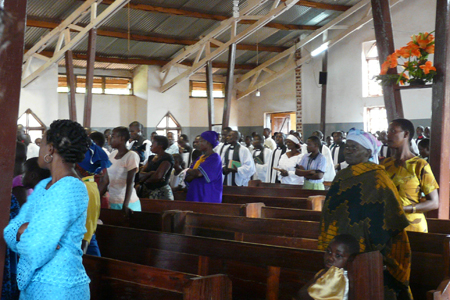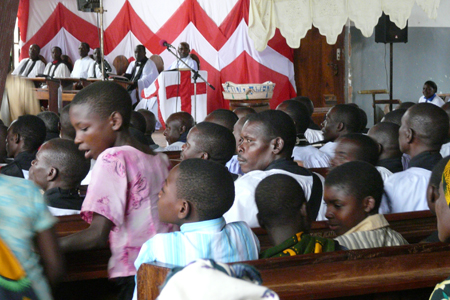| |
 |
 |
 |
| Comment on this report, or find other reports. |
 |
| Our Mystery Worshippers are volunteers who warm church pews for us around the world. If you'd like to become a Mystery Worshipper, start here. |
 |
| Find out how to reproduce this report in your church magazine or website. |
|
|
| 1560: St Andrew's
Cathedral, Kasulu, Tanzania |
 |
 |
 |
Mystery Worshipper:
Liturgist.
The church:
St Andrew's Cathedral, Kasulu, Tanzania.
Denomination:
Anglican
Church of Tanzania, Diocese
of Western Tanganyika.
The building:
The cathedral is a large structure made of locally fired bricks,
with large, unglazed windows and a corrugated iron roof. There
is a free-standing bell tower near the west door. The interior
is fairly plain except for brightly colored fabric hung around
the sanctuary. The altar is free-standing on the nave side of
the sanctuary, with chairs around the walls and additional seats
in the open area east of the altar. The choir sits in a section
of one of the transepts, in choir stalls angled so that they
also face the altar.
The church:
This and the local mosque are the principal religious institutions
in the centre of the town – there are other churches in
several of the nearby villages. The diocese also sponsors a
secondary school and a Bible college near the cathedral.
The neighbourhood:
Kasulu is a small town in the Kigoma region of western Tanzania,
essentially bush country. The region is actually quite beautiful,
with hills, rivers and evergreen forests. Although the town
houses government and UN offices, and has a hotel and some modern
guest houses, much of the population in the area still lives
at a subsistence level. There is no general electricity supply
or proper roads. The residents of Kasulu depend heavily on agriculture.
The town springs to life during the dry season (May to August)
with several religious youth meetings and festivities, presumably
because not much farming takes place at that time of the year.
The cast:
The Rt Revd Gerard Mpango, Bishop of Western Tanganyika, was
the celebrant, assisted by the Rt Revd Sospetre Ndemka, suffragan
bishop, and about 30 priests and deacons whom I could not identify.
This was a special event, the opening day of a diocesan clergy
conference, and nearly all the clergy of the diocese (over 200)
were present, vested and in procession. Nearly all the priests
and deacons wore tippets and surplices (the deacons had the
tippet over one shoulder as if it were a stole), though I did
spot one stole and one alb with the tippet tucked into the girdle
like a stole. Bishop Mpango wore full vestments in red with
gold mitre; Bishop Ndemka wore rochet, red chimere, and red
stole. Mrs Liturgist and I were there in a semi-official capacity
– as a clergyman, I had been invited to give a presentation
about missions, and Mrs Liturgist to help with developing the
college library. At the last minute I was asked to preach at
this service.
The date & time:
6 April 2008, at 9.30am.
What was the name of the service?
Ushirika Mtakatifu (Holy Communion).
How full was the building?
There was one empty seat in the back corner of the sanctuary,
but the rest of the building was packed with people. Those who
couldn't squeeze in stood in the doorways. The bishop estimated
that about 2,500 people must have been present.
Did anyone welcome you personally?
All arrivals received a warm, friendly greeting.
Was your pew comfortable?
Adequately so.
How would you describe the pre-service
atmosphere?
A bit noisy but with a reverent excitement about being there for worship.
What were the exact opening words of the
service?
Kwa Jani la Baba, na la Mwana, na la Roho Mtakatifu. Amen
(In the Name of the Father, and of the Son, and of the Holy
Spirit. Amen.) At least I think that was it; my Swahili is pretty
limited.
What books did the congregation
use during the service?
For the most part none. The people seemed to know the hymns
and service well enough to join in without books. Some brought
their own prayer books. They use a local variant of an older
Book of Common Prayer that incorporates elements from
1549, 1662, and, I think, the African liturgy that the late
Leslie Brown put out when he was Archbishop of Uganda.
What musical instruments
were played?
Keyboard, guitars, flutes and drums.
Did anything distract you?
In a way everything did – it was obviously Anglican but
not your typical American or British service. However, the distractions
were the type that drew my attention to the worship rather than
away from it.
Was the worship stiff-upper-lip,
happy clappy, or what?
Happy, and even clappy, but not what I think of as "happy-clappy."
Rather, it was very cheerful but also very well ordered. The
worship was joyful, not stiff, but it was liturgical and did
not seem to be taking many liberties with the prescribed forms.
It was in Swahili, which I do not understand beyond a dozen
or so words. The choir led the whole congregation in song throughout,
except for one or two anthems. There were several songs scattered
through the service, some traditional hymns in Swahili and others
with a definite African flavour. In most cases the choir both
sang and danced the hymns. The intercessions seemed to be essentially
the prayer for the whole state of Christ's Church, and in the
1662 position, not spontaneous, but not rattled off. At communion
nearly everyone received.

Exactly how long was the
sermon?
29 minutes, including translation time.
On a scale of 1-10, how good was the preacher?
Since I was the preacher I will refrain from commenting. It
was the first time I had ever used a translator, though, and
it seemed to go very well.
In a nutshell, what was
the sermon about?
The epistle reading was from 1 Peter 5 ("Elders, tend your flock.
Flock, submit to your elders and cast your cares upon the Lord").
The Swahili word for "elder" is wazee; there is another
word for old person that means, literally, "one who has
eaten much salt." An elder may be old, but he is always
experienced. Clergy should care for their charges in exactly
the manner Peter prescribed.
Which part of the service
was like being in heaven?
The sheer enthusiasm of the people for Christ. This was especially
evident at the offertory, when the whole congregation danced
up to the front to make their offerings. Also, the choir dancing
as they sang.
And which part was like being in... er... the other place?
The language barrier made it impossible to participate fully
– but Mrs Liturgist and I both felt immersed in the experience.
What happened when you hung around after the service looking lost?
We couldn't avoid being caught up in the crowd.
How would you describe the after-service
coffee?
There was none – just friendly conversation in the churchyard and, for me, a gathering with the other clergy.
How would you feel about making this church your regular (where 10 = ecstatic, 0 = terminal)?
8 – What a joy to be in a packed church of spirit-filled
worshipers! But alas, this is not my home and I do not know
the language.
Did the service make you feel glad to be a
Christian?
Ecstatic!
What one thing will you remember about all this in seven days' time?
The sheer joy of it all, and the opportunity which we both had
to address thousands of Christians with a shared faith. |
|
|
 |
 |
 |
| We rely on voluntary donations to stay online. If you're a regular visitor to Ship of Fools, please consider supporting us. |
 |
 |
 |
| The Mystery Pilgrim |
 |
| One of our most seasoned reporters makes the Camino pilgrimage to Santiago de Compostela in Spain. Read here. |
 |
 |
 |
| London churches |
 |
| Read reports from 70 London churches, visited by a small army of Mystery Worshippers on one single Sunday. Read here. |
| |
|
|
|
|


